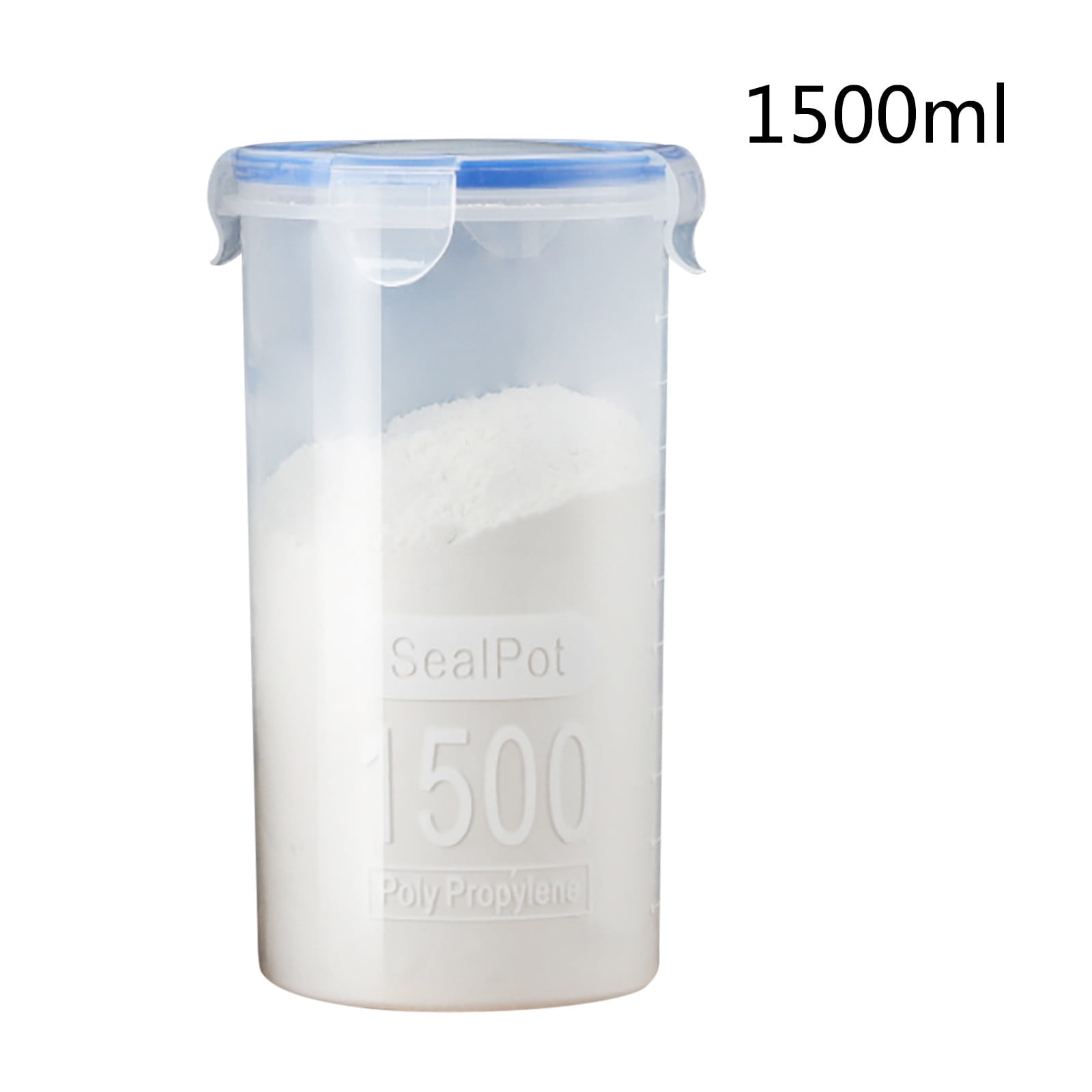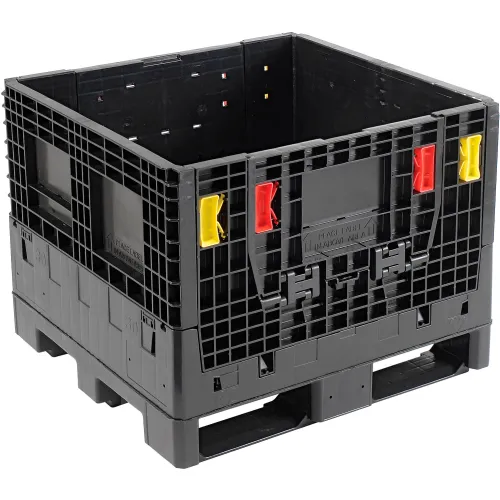Discover clever ways to organize goods with plastic bulk containers
A Comprehensive Overview to the Different Kinds of Bulk Plastic Containers Available Today
Bulk plastic containers play an important duty in numerous markets, using remedies for storage space and transport. Their diverse types accommodate various needs, from rigid options for solid materials to flexible containers accommodating different shapes. Each type offers unique advantages, making it vital to comprehend their applications and attributes. As sectors advance, so do the needs for efficient container options. What elements should one think about when selecting the right mass container?
Summary of Bulk Plastic Containers

Sorts Of Mass Plastic Containers
Mass plastic containers can be found in various forms, each fit to details applications. Inflexible mass containers, adaptable bulk containers, and intermediate bulk containers represent the key classifications, each offering distinct benefits. Comprehending these kinds is necessary for selecting the appropriate container for moving and storing products.

Rigid Bulk Containers
Inflexible bulk containers are vital for reliable storage space and transportation of numerous materials throughout markets. These containers are typically constructed from durable plastics, permitting them to hold up against severe handling and ecological problems. They can be found in various shapes and sizes, consisting of containers, drums, and totes, making them suitable for storing whatever from granular compounds to liquids. Rigid containers often include enhanced wall surfaces and protected covers, making sure the materials remain safeguarded throughout transportation. Their stackable design maximizes storage area, making them suitable for storehouses and making centers. Additionally, several inflexible mass containers are reusable and recyclable, adding to sustainability initiatives. On the whole, their robustness and versatility make rigid bulk containers an essential part in supply chain procedures.
Adaptable Mass Containers
Versatile mass containers, typically described as versatile intermediate mass containers (FIBCs), act as a functional solution for keeping a selection and transferring of completely dry products. These containers are normally made from woven polypropylene and are created to be lightweight yet solid, enabling reliable handling and piling. Their versatility enables them to fit numerous forms and sizes, making them ideal for products ranging from grains to chemicals. FIBCs can be equipped with functions such as spouts for very easy dental filling and discharge, as well as protective coatings for improved sturdiness. Additionally, they are recyclable and recyclable, contributing to sustainable methods in sectors such as farming, food processing, and building. In general, versatile mass containers offer a affordable and efficient alternative for mass material management.
Intermediate Bulk Containers
Intermediate bulk containers (IBCs) are important for the effective transportation and storage space of fluids and granular materials across different sectors. These containers normally have a capacity varying from 275 to 330 gallons and are created for very easy piling and handling. Made from resilient products like high-density polyethylene or steel, IBCs offer superb protection against contamination and environmental variables. Their style consists of features such as a built-in pallet for forklift accessibility and a removable top for very easy filling and cleansing. IBCs are widely made use of in chemical, food, and pharmaceutical markets, ensuring conformity with security guidelines. Their adaptability and reusability make them a cost-effective remedy for bulk storage and transport, adding to provide chain effectiveness and sustainability.
Attributes and Benefits of Mass Plastic Containers
Mass plastic containers are vital tools in different industries, providing a mix of toughness and practicality. These containers are created from premium materials, making them resistant to impacts, chemicals, and ecological elements. This toughness guarantees item safety during storage and transport.
Furthermore, bulk plastic containers are lightweight, promoting ease of taking care of and decreasing delivery costs. Their stackable layout maximizes storage space effectiveness, permitting for optimized warehouse space. Several versions feature safe covers or closures, supplying an impermeable seal that prevents and protects contents contamination.
Mass plastic containers are recyclable and commonly reusable, adding to sustainable methods. Their adaptability enables a vast range of applications, from food storage space to commercial usage, improving their value throughout fields. Businesses gain from the lengthy life expectancy and low upkeep requirements of these containers, making them a cost-efficient option for both long-term and short-term demands.
Industries That Use Bulk Plastic Containers
Different sectors take advantage of using bulk plastic containers, each leveraging their special residential or commercial properties for details applications. The food and drink industry counts on these containers for secure storage space and transport of items, while the chemical manufacturing market utilizes them for dealing with harmful materials. In addition, the pharmaceutical distribution requires emphasize the value of longevity and tidiness in packaging services.
Food and Drink Industry
As the demand for effective and secure storage space options remains to climb, the food and beverage market increasingly relies upon bulk plastic containers for their operational demands. These containers supply robust, lightweight, and versatile alternatives for storing components, finished products, and waste products. Made from food-grade materials, they guarantee compliance with health and wellness and safety standards. Different layouts, such as stackable bins and lug boxes, enhance room during transportation and storage, boosting logistical effectiveness. Furthermore, the openness of some mass containers permits for simple stock management, lowering the Click This Link threat of putridity. With the sector's focus on sustainability, several suppliers are currently providing recyclable and multiple-use options, aligning with environment-friendly methods while fulfilling the high needs of food security and hygiene.
Chemical Production Industry
The chemical production industry depends heavily on bulk plastic containers for the secure and effective storage of basic materials, intermediates, and completed products. These containers are designed to hold up against different chemicals, ensuring that dangerous products do not leakage or degrade the container itself. Common types include high-density polyethylene (HDPE) and polypropylene containers, which provide exceptional chemical resistance and resilience. Their light-weight nature and stackable layout promote transportation and storage, enhancing room in making facilities. In addition, numerous bulk plastic containers come with functions such as tamper-evident seals and easy-to-read labeling, enhancing security and conformity with sector laws. In general, bulk plastic containers are important to the chemical manufacturing process, providing trustworthy remedies for dealing with varied materials.
Drug Circulation Demands
Drug distribution relies upon mass plastic containers to meet strict safety and regulative demands. These containers are necessary for keeping a selection and carrying of pharmaceutical products, consisting of active pharmaceutical ingredients (APIs) and completed medications. Their design warranties security against dampness, contamination, and light, keeping the integrity of delicate products. In addition, bulk plastic containers are certified with sector standards such as Good Production Practices (GMP) and are usually made from products that are FDA-approved. Using these containers boosts efficiency in the supply chain, enabling risk-free, large circulation while reducing waste. Companies in the pharmaceutical industry focus on making use of long lasting, leak-proof, and tamper-evident containers to guarantee product safety and security and top quality throughout the logistics process.
Factors to consider for Selecting the Right Container
When choosing the suitable bulk plastic container, various variables must be meticulously considered to assure perfect performance and safety and security. The nature of the products to be saved is extremely important; compatibility important link with the container's product can influence integrity and safety and security. bulk plastic containers for sale. Furthermore, the container's size and form have to straighten with the storage space and transport demands, guaranteeing efficient room usage
Tons ability is another crucial consideration, as it needs to fit the weight of materials without risk of damages or failure. The style attributes, such as venting or covers, can impact usability and gain access to. Compliance with industry guidelines is crucial, especially in fields like pharmaceuticals, where security standards are stringent.
Finally, the anticipated life expectancy and durability of the container must be analyzed to validate it satisfies the functional requirements without constant substitute. By examining these aspects, one can select one of the most ideal mass plastic container for certain applications.
Ecological Effect and Sustainability
As organizations significantly focus on sustainability, the ecological impact of bulk plastic containers has actually come under analysis. These containers, typically made from products such as polyethylene or polypropylene, contribute greatly to plastic waste otherwise taken care of correctly. Their production entails the intake of fossil gas, which can lead to enhanced over at this website greenhouse gas emissions. Improvements in reusing modern technology and the growth of biodegradable choices are assisting to mitigate these issues.
Additionally, lots of makers are embracing practices that emphasize making use of recycled materials, thereby minimizing the need for virgin plastics. The sturdiness of bulk plastic containers also plays a role; they are made to be reused numerous times, which can decrease their general ecological impact when contrasted to single-use options. Inevitably, the industry deals with the obstacle of stabilizing performance with ecological duty, making sustainable methods important for the future of mass plastic containers.
Finest Practices for Storage Space and Transportation
Reliable storage and transport of bulk plastic containers significantly influence both operational performance and sustainability. To make best use of space, organizations ought to pile containers securely, guaranteeing stability and stopping damage. Correct labeling is necessary for simple recognition, which enhances access procedures. Furthermore, preserving a tidy and well organized storage location decreases the danger of contamination and enhances security.
For transportation, picking the appropriate car is essential; containers should be secured to avoid shifting during transit. Business ought to additionally consider making use of pallets to assist in less complicated loading and discharging. Routine assessments of containers for wear and tear can stop expensive substitutes.
Temperature control is another vital element, as severe conditions can compromise the honesty of the plastic. Training workers on ideal methods for handling and transport assurances conformity and promotes a culture of safety. By carrying out these finest practices, services can improve their operational effectiveness while adding to environmental sustainability.
Regularly Asked Questions
Just how Do I Tidy Mass Plastic Containers Effectively?
To tidy bulk plastic containers properly, one should rinse them with cozy water, use a moderate cleaning agent and scrub with a soft brush. Wash completely, after that permit to air dry entirely before storage or reuse.
What Is the Life-span of Mass Plastic Containers?
The lifespan of bulk plastic containers typically varies from 5 to ten years, depending on the product, usage, and ecological problems. Appropriate upkeep and storage space can significantly extend their usability and resilience in time.
Can Bulk Plastic Containers Be Customized?

Do Bulk Plastic Containers Have Service Warranty Options?

Exist Rules for Making Use Of Bulk Plastic Containers?
Yes, regulations exist for using mass plastic containers, mainly focused on safety, ecological impact, and product compliance. These laws guarantee that containers meet market standards and appropriate for carrying various compounds safely and efficiently.
Inflexible bulk containers, versatile mass containers, and intermediate mass containers stand for the primary categories, each offering special benefits. Versatile bulk containers, typically referred to as flexible intermediate bulk containers (FIBCs), serve as a flexible solution for keeping a variety and moving of dry materials. The chemical manufacturing field relies greatly on bulk plastic containers for the reliable and secure storage space of raw materials, intermediates, and completed items. Bulk Plastic Containers. These containers are developed to endure various chemicals, making certain that harmful materials do not leak or weaken the container itself. In addition, bulk plastic containers are compliant with industry criteria such as Good Production Practices (GMP) and are typically made from products that are FDA-approved